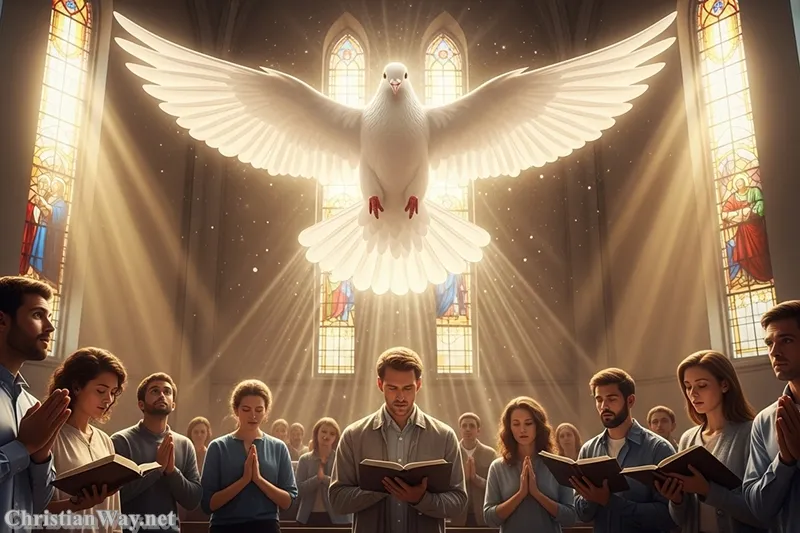Dear friends in Christ,
Every heart that turns to God soon discovers that faith is not only belief but a living power — something that breathes, moves, and transforms from within. For many Protestant Christians, this inner source of life and renewal is none other than the Holy Spirit, the very breath of God poured out upon believers through faith in Jesus Christ.
The Holy Spirit is not an idea, not an abstract force, but the living presence of God who enters the soul, stirs the conscience, and strengthens the heart to love and serve Christ. In the Protestant tradition, this reality is deeply personal. It is the Spirit who awakens faith, convicts of sin, comforts in sorrow, and empowers the believer to walk daily in the light of the Gospel.

Let us take time to dwell on how Protestant faith understands the Holy Spirit — not as a distant mystery, but as God Himself dwelling within us, guiding, renewing, and sanctifying those who trust in Christ.
The Promise of the Spirit: God’s Presence in Every Believer
In the New Testament, Jesus made a promise that stands at the heart of Christian life:
“And I will ask the Father, and He will give you another Helper, to be with you forever — the Spirit of truth.”
— John 14:16–17
This promise is cherished deeply within Protestant theology. It means that the Holy Spirit is not limited to prophets, priests, or select individuals, but is given freely to every believer who confesses Jesus Christ as Lord.
For Protestants, this truth flows from the central belief in the priesthood of all believers — that every Christian, through faith and the indwelling Spirit, has direct access to God. The Spirit dwells not in temples made by human hands, but in the living hearts of those redeemed by grace.
When Martin Luther spoke of faith as a gift of the Spirit, he was describing the miracle of divine intimacy: God not only forgives from afar but enters into the believer’s life to renew the will, enlighten the mind, and empower the heart.
The Spirit is the inner witness who assures us that we are children of God (Romans 8:16). This assurance does not rest on emotion or achievement, but on the quiet, powerful presence of the One who lives within us — a presence that whispers peace, conviction, and hope.
The Spirit and the Word: Illumination, Not Substitution
In Protestant faith, Scripture holds a central place, and the Holy Spirit is seen as its divine interpreter. The Spirit and the Word are never separated. The Reformers taught that the Bible is inspired by the Spirit, and the believer illumined by the same Spirit can understand its truth.
John Calvin wrote that the Word of God “requires the inner testimony of the Holy Spirit” to truly enter our hearts. Without the Spirit’s light, the Bible remains a closed book; with the Spirit, it becomes a living voice.
The Spirit does not replace Scripture or add new revelations beyond it. Instead, He makes the Word alive, personal, and transforming. He enables the believer to see not only the text but the Person behind it — the living Christ.
This conviction shaped the Protestant tradition of preaching and personal Bible reading. Whether in a humble home or a grand cathedral, the Spirit is believed to be at work whenever the Word is faithfully proclaimed, guiding hearts into truth, conviction, and renewal.
“For the letter kills, but the Spirit gives life.”
— 2 Corinthians 3:6
The Spirit breathes through the written Word to awaken living faith.
The Spirit’s Work of Regeneration
Protestant teaching emphasizes that salvation begins not with human effort, but with the regenerating work of the Holy Spirit.
“Unless one is born of water and the Spirit, he cannot enter the kingdom of God.”
— John 3:5
This new birth is the Spirit’s secret work in the human soul — the moment when faith comes alive, when repentance becomes real, and when grace transforms what was once dead into new life.
For many Protestants, especially within Reformed and Evangelical traditions, this act of regeneration marks the beginning of the Christian journey. It is entirely the work of God’s grace — not something earned, but received.
The Spirit convicts the heart of sin, opens the eyes to Christ, and breathes life where there was none. Just as God once breathed into Adam the breath of life, so the Spirit breathes divine life into the sinner, raising them from spiritual death to living faith.
This renewal is not momentary; it is the ongoing work of sanctification — the daily shaping of the believer’s character into the likeness of Christ.
The Spirit and Sanctification: The Journey of Growth
Sanctification — the lifelong process of becoming holy — is a theme that runs deep in Protestant spirituality. It is the Spirit who carries the believer from conversion to maturity, from faith to faith.
“But the fruit of the Spirit is love, joy, peace, patience, kindness, goodness, faithfulness, gentleness, self-control.”
— Galatians 5:22–23
Protestants see these fruits not as human achievements but as divine gifts, evidence that the Spirit is at work. Sanctification is not a ladder of self-improvement but a deepening relationship with God.
Through the Spirit, believers are freed from the tyranny of sin and gradually renewed in thought and action. The old nature — selfish, fearful, proud — begins to yield to the new life of Christ within.
In this way, holiness becomes not an external standard but an inner transformation. The Spirit leads, corrects, and comforts — not as a distant lawgiver but as a loving companion who dwells in the believer’s heart.
“Where the Spirit of the Lord is, there is freedom.”
— 2 Corinthians 3:17
Freedom, in the Protestant sense, is not freedom to do as one pleases, but freedom to live as God intended — in love, humility, and truth.
The Spirit and the Church: A Fellowship of the Redeemed
Protestant theology holds that the true Church is not defined by hierarchy or walls, but by the presence of the Holy Spirit among believers. The Spirit forms the Body of Christ, uniting all who have faith in Him, regardless of denomination or nation.
This invisible unity is often described as the “communion of saints.” The Spirit transcends all divisions of culture and institution, binding believers together through love and shared faith.
When Christians gather to pray, sing, or break bread, it is the Spirit who animates their worship. He is the unseen presence in every hymn, the quiet strength behind every prayer, and the peace that flows through every act of grace.
Protestant worship, therefore, often emphasizes freedom and personal expression — not to promote disorder, but to acknowledge that the Spirit moves in ways that cannot be confined. Whether in a simple country chapel or a modern city congregation, the same Spirit breathes life into the hearts of all who call on the name of Jesus.
The Spirit’s Gifts: Empowering for Service
Another mark of the Spirit’s presence in Protestant life is the variety of spiritual gifts (charismata) given for the building up of the Church.
“Now there are varieties of gifts, but the same Spirit.”
— 1 Corinthians 12:4
These gifts — teaching, mercy, prophecy, healing, tongues, administration, and many others — are not marks of superiority but of service. Each is given “for the common good” (1 Corinthians 12:7).
In the Protestant world, especially in Pentecostal and charismatic movements, there is a renewed emphasis on these gifts as signs of the Spirit’s continuing vitality in the Church. The outpouring of spiritual gifts reminds believers that the God who spoke at Pentecost still speaks, heals, and empowers today.
Yet even here, the heart of Protestant teaching remains the same: the greatest gift of the Spirit is love — the love of God poured into the heart, enabling believers to serve one another humbly and faithfully.
“If I speak in the tongues of men and of angels but have not love, I am nothing.”
— 1 Corinthians 13:1
The Spirit and Daily Life: Living by Grace
To live “in the Spirit” is to live daily by grace. Protestant spirituality insists that faith is not confined to Sunday worship but touches every aspect of human existence — work, family, suffering, and joy.
The Spirit guides conscience, strengthens resolve, comforts in grief, and sustains faith in trials. In moments of weakness, He becomes the intercessor:
“The Spirit Himself intercedes for us with groanings too deep for words.”
— Romans 8:26
This is perhaps one of the most comforting truths in Protestant belief — that even when our words fail, the Spirit prays within us. Our faith is never sustained by our strength alone but by the Spirit’s gentle and faithful presence.
Each morning, the believer awakens to a new opportunity to walk by the Spirit — to forgive, to hope, to serve, and to love. The Spirit is the breath behind every act of obedience and the quiet voice reminding us that grace is enough.
The Spirit and the World: Witness and Renewal
Finally, Protestant theology sees the Holy Spirit as the One who not only renews the individual but also empowers the Church for mission.
From the first Pentecost onward, the Spirit has been the driving force of Christian witness. He sends believers into the world with courage and compassion, equipping them to proclaim the Gospel in word and deed.
In every age, revival movements — from the Reformation to the Great Awakenings — have been understood as works of the Spirit. When hearts are stirred, when repentance deepens, when love for Christ is renewed, Protestants see in it the breath of God moving once again across dry bones.
“You will receive power when the Holy Spirit has come upon you, and you will be my witnesses.”
— Acts 1:8
The Spirit is God’s power made personal — a flame that ignites the Church not for self-preservation but for service, not for comfort but for calling.
Reflect and Pray
The Holy Spirit, in Protestant faith, is not a distant mystery but the intimate companion of every believer — the voice that calls, the fire that purifies, and the breath that sustains. Through Him, the love of Christ becomes a living reality in the heart, and the Church becomes a living witness in the world.
Dear reader, may you learn to listen to His whisper in your soul — in Scripture, in prayer, in the quiet moments of life. He is always near, always patient, always faithful.
“Come, Holy Spirit, fill the hearts of Your faithful,
and kindle in us the fire of Your love.
Send forth Your Spirit, and we shall be created,
and You shall renew the face of the earth.”
May the breath of God dwell richly in you, giving you strength, wisdom, and peace.
— Fr. John Matthew, for Christian Way





